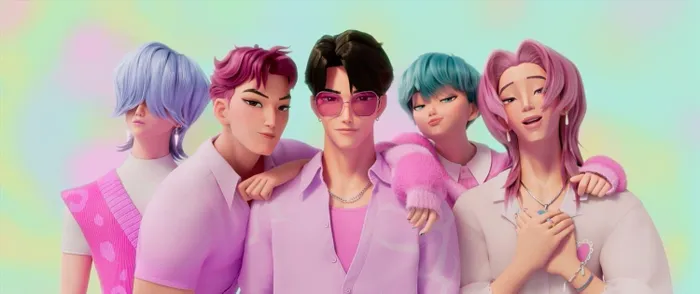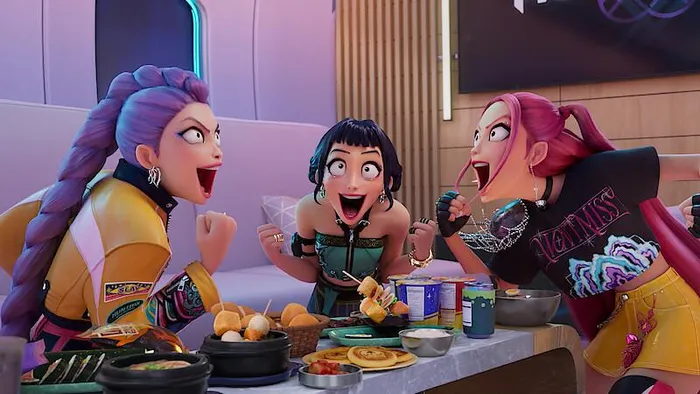How ‘KPop Demon Hunters’ became a global phenomenon

KPop Demon Hunters the show that surprised all by smashing records at Netflix.
Image: Supplied
Jeff Yang
My initiation into the “KPop Demon Hunters” phenomenon came while traveling on vacation in Taiwan, courtesy of my 19-year-old niece, Sienna.
“Sorry, but you have to watch this if you want to stay part of my family,” she announced, before clicking the link at the top of her “recently watched” list. Both I and my 21-year-old son feebly protested that we “weren’t really in the demo” for the movie, but to no avail.
Ninety minutes later, we found ourselves repeatedly rewinding it to belt out our own baritone versions of the show’s soaring power ballad, “Golden.”
It turned out we were in the demo after all. And so are a legion of other viewers of all backgrounds, who have watched it 106 million times and counting - putting the debut feature from Maggie Kang (its creator, co-writer and co-director) on pace to become the most-watched animated movie in Netflix history, while sending it soaring up the lists of the platform’s most-watched movies of any kind, period.
Since its premiere, the movie has hit Netflix’s top 10 list in all 93 countries the streaming service tracks. The show’s two idol groups, fiend-fighting femmes fatales Huntr/x and their rivals, the hunks-from-hell Saja Boys, have become the highest-charting female and male K-pop groups with U.S. audiences in Spotify’s history - despite being, you know, fictional. Two of their songs have topped the streaming rankings, a peak even flesh-and-blood superstars Blackpink and BTS have yet to summit.
But these stats aren’t what convinced me that this movie is a cultural milestone. That happened when, the following day, we booked a ride to dinner and the driver, a middle-aged Taiwanese woman, was blasting the “KPop Demon Hunters” soundtrack on the car’s stereo. In my halting Chinese, I commented on her choice of music. Her response: “Sorry, but you have to listen to this if you want to stay in my car.” Within minutes, we were engaged in an impromptu sing-along as we slogged our way through a summer typhoon.
What accounts for the staggering popularity of “KPop Demon Hunters”? It’s not quite your Little Indie Film That Could - it was produced by Sony Pictures Animation, the studio behind the Spider-Verse movies - but Netflix initially didn’t seem to know what it had, doing relatively little to promote the movie, which recorded a relatively modest 9.2 million views in its first week.
And then, shockingly, it grew by word of mouth - first among those passionate about K-pop, of course, then far beyond that group. It seemed to dance with ease among American, Asian and other global audiences, grabbing eyeballs and planting earworms along the way. Even viewers who think “Blackpink in your area” sounds like a medical diagnosis found something to enjoy.
That expansion of the audience might have to do with the fact that many on the film’s creative team are Asians in North America, whose cultural roots on both sides of the Pacific helped them to intuitively find the Venn diagram overlap of taste in between.
Kang is a Canadian who was born in Seoul; the stellar cast largely comprises Korean Americans and Canadians; the film’s dialogue, and the tone, accent and diction in which it is delivered, is North American English. Even the songs are sung in English (with a few Korean lines to keep them honest) by performers born, raised and/or educated in the U.S. and Canada. It remains an authentically South Korean story, with details and references that reflect a deep and careful respect for the nation’s history and pop culture, but one told through the lens of the South Korean diaspora.

The show has is able to create something that anyone Korean would recognize, and anyone not Korean could understand.
Image: Supplied
“It sounds like a paradox, but it’s about balancing the universal and the specific,” says actor Daniel Dae Kim, who has a small but hilarious role in the movie. “By leveraging the identity of diaspora Koreans, [‘KPop Demon Hunters’] was able to create something that anyone Korean would recognize, and anyone not Korean could understand.”
That makes “KPop Demon Hunters” exceptionally rare in Hollywood, although it might become less rare very soon: an example of how Asian Americans can serve as the interpreters and globalizers of authentic and original Asian stories, bringing them to the world without the stigma of “whitewashing” that often occurs when content crosses oceans.
It’s a promise we’ve been waiting for ever since San Francisco-born and Hong Kong-raised Bruce Lee proved that an Asian American storyteller could fuse two cultures to make something universally beloved. It’s a promise that we’ve seen flare up in gate-crashing projects such as “Crazy Rich Asians,” set in Singapore with an “Asian Avengers” cast assembled from around the world. And with the triumphant breakout of “KPop Demon Hunters,” it’s a promise that many hope is on the verge of being fulfilled.
Last week, Amazon Studios released the trailer for its high-octane spy thriller series “Butterfly,” produced by and starring Kim and shot entirely in Seoul. This week, Hybe - BTS’s management and production company - announced that it is collaborating with Paramount on a feature film set in the world of K-pop, directed by Korean American filmmaker Benson Lee, and starring Ji-young Yoo (who plays Zoey in “KPop Demon Hunters”) and Atlanta-born K-pop star Eric Nam.
“In the past, neither Asia nor Hollywood were particularly interested in Asian Americans,” says Kim. “But we’re starting to see a shift. I’m seeing it in Korea, certainly. They used to laugh and ask, ‘Why can’t you speak better Korean?’ But now that they aspire to become a world leader in pop culture, they’ve begun to see those of us in the diaspora as a unique resource.”
It’s an exciting reminder of how immigrant communities are often a boon, culturally and commercially, to both their adopted homeland and their ancestral one. Hollywood was built by immigrants, after all, and their innate feel for cultural fusion is the superpower that has fueled America’s rise to pop culture dominance. Isn’t it ironic that, just as South Korea is embracing these overlapping identities as a recipe for global success, the message America is increasingly sending is that, if you’re “not really in the demo,” it might not want you here at all?
- Jeff Yang is the author of “The Golden Screen: The Movies That Made Asian America.”